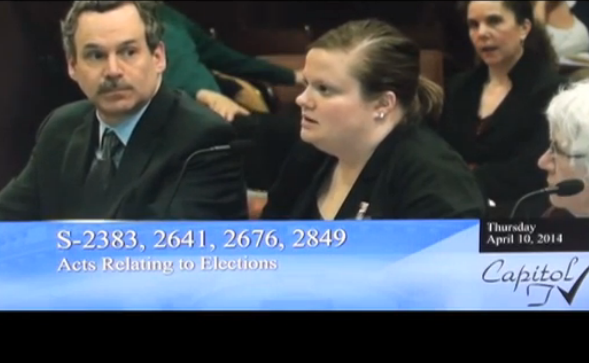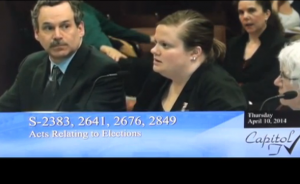
If you want to know why all the pro-payday loan industry advocacy has been done in backrooms of the State House by high-priced speaker-turned-lobbyist Bill Murphy and out-of-state special interests, look no further than today’s Providence Journal editorial on the subject.
It’s evidence that a credible argument can’t be made for this predatory practice. There’s at least one error, manipulation of fact, insulting derogation or full-on lie in every paragraph but the last two!
Let’s go through them all, shall we…
With many Rhode Islanders struggling, and traditional banks unwilling to tide them over, it is clear there is a consumer need for what is known as payday loans.
It’s true there are many Rhode Islanders struggling, and it’s also (sort of) true that traditional banks don’t offer a similar product (Navigant Credit Union does, but many do not). But that in no way, shape or form means there is any kind of consumer need for a payday loan! This, of course, is just basic logical fallacy 101 stuff, but it’s important to note because there’s usually something fishy if someone needs to toss aside the laws of logic in order to sell their point.
Here’s what it looks like as an equation: A (people struggling) + B (banks not helping) =/= C (We need big corporations to loan fast cash to struggling poor people at astronomically high interest rates). Said another way, the existence of something does not mean there is a need for that thing. Or, I guess there is a need for teachers’ unions and master levers?
Neither government nor charities have stepped in at the level required to meet that need, and are not expected to do so.
It’s insulting to suggest there are no other ideas or alternatives out there. The Capital Good Fund has received tons of attention for their alternative product to payday loans, as has Navigant Credit Union and the West Elmwood Housing Association. And as far as what the writer expects to happen … both Gina Raimondo, often hailed for her ability to get things done, and Seth Magaziner, have put forward ideas to rid Rhode Island of payday lenders. Magaziner was just this week given a true rating by Politifact in another part of the Providence Journal on one of his ideas for addressing payday loans. Here are more suggestions from the Pew Center.
Other forms of obtaining money to meet obligations — including turning to loan sharks — may be much worse for borrowers than payday loans.
That payday lenders are somehow protecting poor people from the “loan sharks” is one of the worst lies the payday lenders and their lobbyists spread. Here’s a good place to start for some scholarly research on the payday loans or else loan shark canard: LOAN SHARKS INTEREST-RATE CAPS AND DEREGULATION. And the Pew Center says 81 percent of people would just cut back on expenses.
Hence, it makes sense to have a regulated payday loan industry operating in Rhode Island.
Well, no. See logical fallacy 101.
In part because Rhode Island politicians have created one of the worst business climates in America, many people in the state are struggling, living on the edge. An occasional advance on a paycheck — while not cheap — can help them avoid even more costly financial losses, such as paying large penalties to restore electricity or heat.
Oh, come on! I’m half surprised the author didn’t blame the calamari bill for the payday lending! This is, of course, ridiculous pandering to hate radio-style talking points. How about we just make it against the law to cut of someone heat in the dead of winter?
Such are the decisions that people freely make, after weighing the consequences.
This isn’t so much untrue as it is just completely devoid of any understanding of poverty, and it really has no place in Rhode Island’s paper of record.
Much as we might wish our neighbors did not face such hard choices in life, our pretending their problems do not exist does not make them go away.
It’s true, ignoring a problem doesn’t make it go away. Neither does a payday loan though. Pew research shows 69 percent use payday loans for recurring expenses, and one in seven can’t afford the loan. If people can’t afford their bills at 0 percent interest, how does charging them 260 percent interest help?
Unfortunately, some activists would like to take away these choices by shutting the door on payday loans.
In addition to “some activists” there’s also 3/4 of all Rhode Islanders, according to a 2012 Public Policy Polling survey, all Democrats running for governor and most members of the General Assembly. Eliminating payday lending is the one thing Angel Taveras and Gina Raimondo have ever agreed on, and the Providence Journal editorial page pretends as if it’s just “some activists.” That’s wrong.
One proposal, to arbitrarily cap annual interest rates for short-term loans at 36 percent, would have that effect.
Actually, 36 percent is not an arbitrary number. It’s the state law for maximum usury rate for every other kind of loan in Rhode Island except payday loans. Payday loans, as a matter of fact, were given an arbitrary carve out of the state’ usury laws in 2001.
Lenders say they would have to pull out of Rhode Island, as they could not turn a profit at that rate, given their costs of doing business with high-risk borrowers.
Who knows if this is true or not (let’s hope it is, though!) but what we do know is the Providence Journal editorial board and other corporate apologists will claim anyone and everyone is leaving Rhode Island if it means hey can advocate for more conservative policy.
Most people using the service take out a loan for only a short period and pay it back, with 10 percent interest.
Most people who take out a payday loan end up taking a subsequent payday loan to pay for the prior one. So, yes, they are paid most often paid back, but they are most often paid back with a new payday loan.
Spread over a year, the interest rate looks like a staggering 260 percent, but that is not how people actually use payday loans.
Yes it is, here’s the data. Most payday loan customers take out 8 loans a year and 63 percent use them 12 times a year.
The General Assembly has done the right thing in refraining from legislating such loans out of existence. Such a political attempt to dictate the marketplace, while pleasing to activists, would only hurt people in need. Rather, the state should permit this industry, which does create jobs and tax revenues, to function under a regulated structure.
Again, the General Assembly actually legislated them into existence, thus creating a market for them.
Regulations should be based around some key goals: protecting access to short-term loans by those who may occasionally desperately need them; shielding consumers from unscrupulous or unregistered operators; fostering a competitive marketplace to give borrowers greater choices, something that would tend to lower rates.
If the goal is to limit the need for payday loans, rather than merely their availability, the best thing the General Assembly could do is create a climate much less hostile to business, with better-paying jobs and greater opportunity.
These are the only factually correct and/or intellectually honest statements in the entire piece. At least, I guess, it went out on a high note…





